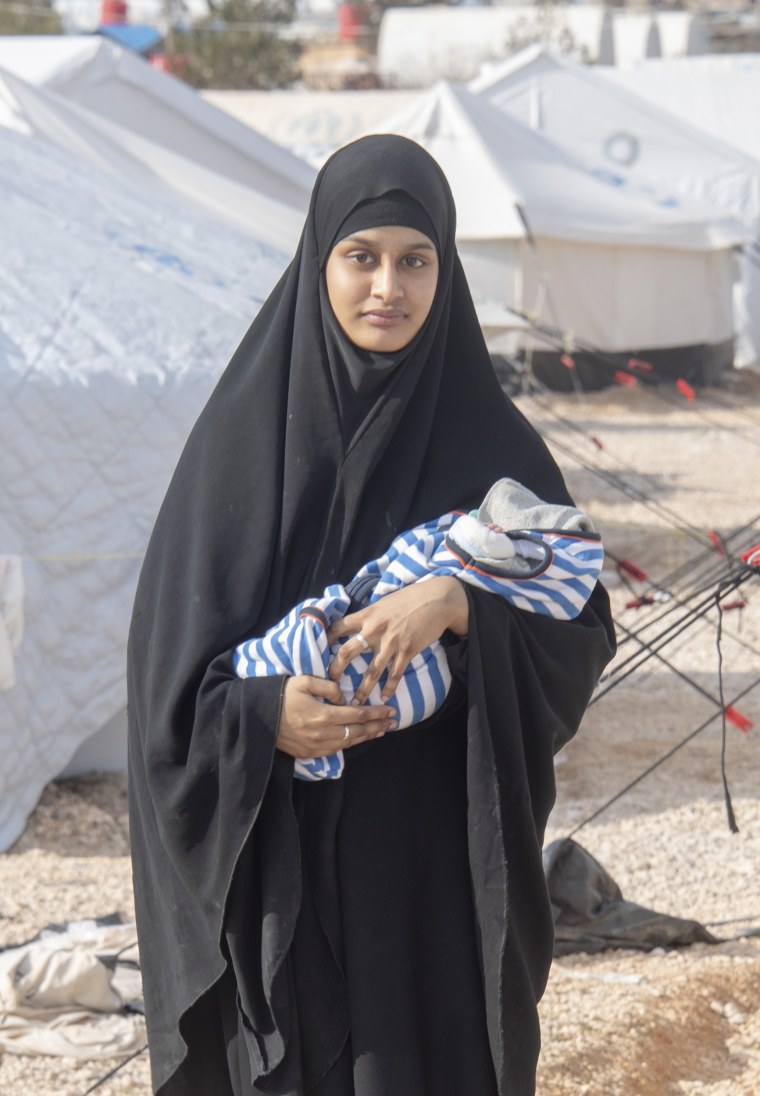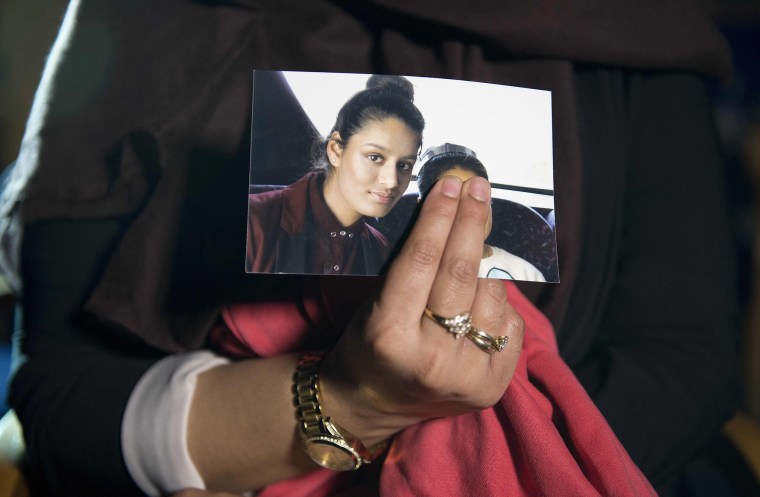LONDON — Shamima Begum was 15 when she and two friends left their home in east London to join the Islamic State in Syria.
She was 19 when she emerged from the terrorist group’s collapsing “caliphate” — prompting the British government to strip her of citizenship and declare she would never be allowed to return to the country.
And she was 21 when the Supreme Court issued a landmark ruling that she could not come back to London to appeal the loss of her citizenship. Her future is in legal limbo and her home is now a refugee camp in northern Syria.
The story has consumed the British press, which has lingered on details of how the schoolgirl became a “jihadi bride” and how all three of the children she had with a Dutch ISIS fighter died as infants in Syria.
But less discussed is the chill that the case has sent through many other British children of immigrants. Many have watched in alarm at how easily their government took citizenship away from a woman of color who was born and raised in the United Kingdom.

“It makes all of our citizenship precarious, and based on our skin color, our religion, and our heritage. That's a very dangerous precedent and I do not believe that Britain should go down this route,” said Halima Begum, chair of the Runnymede Trust, a racial equality think tank.
Halima Begum, a British-born woman of Bangladeshi descent, is also from East London. In theory, she could be vulnerable to the same legal logic that the U.K. government relied on in citizenship-stripping cases.
It is against international law for any government to make a person stateless. But the Home Office, which is responsible for immigration, successfully argued Shamima Begum would not be stateless because she is eligible for citizenship in Bangladesh through her parents.
But Begum has never been to Bangladesh, does not have a passport, and cannot speak the language.
Moreover, Bangladesh says she is not a citizen and won’t take her in.
"The British government is responsible for her. They'll have to deal with her," the country’s foreign minister told the BBC.
That leaves her in a legal purgatory and facing indefinite detention in Syria by Kurdish forces. Other British children of immigrants argue the U.K. would never wash its hands of a white person in the same way.
“Britain operates a two-tier citizenship: one for white Brits and one for nonwhites,” Repi Rafike, 37, a lawyer, said. “We face a potential threat of our citizenship being stripped at any time.”
There is no suggestion Britain is planning any kind of widespread cull of passports. But it is unique among Western allies in severing ties with – and some argue dodging responsibility for — its nationals who joined ISIS.
The United States has repatriated dozens of American ISIS members and put them on trial in federal courts. The U.K. has taken a very different approach, instead taking away passports where it is legally able to. It has left some former citizens, like Begum, in Syria. Others, like the surviving members of the “Beatles” cell of ISIS torturers, it has handed over to the U.S.
The U.K. has stripped citizenship away from at least one white ISIS member, a dual British Canadian citizen named Jack Letts. But unlike Bangladesh, Canada has officially acknowledged that Letts is one of its citizens, meaning there is no question of him being left stateless. The majority of Britons who joined ISIS are of Arab or South Asian descent and they make up the majority those who have lost passports.
The British government declined to comment on Shamima Begum’s case specifically but its guidelines say the Home Office has the power to deprive people of citizenship in cases of national security and that ethnicity should have no bearing on the decision.
Painful questions about what it takes for immigrants and their children to be considered “truly British” go far beyond the Muslim community, which has been under particular scrutiny since the Sept. 11, 2001, terror attacks on the U.S. and the 2005 Al Qaeda bombings in London.
In 1990, Norman Tebbit, a senior minister in then-Prime Minister Margaret Thatcher’s government, suggested the loyalty of British Asians could be measured by whether they cheered for England’s cricket team in matches against India or Pakistan. The so-called Tebbit Test has since become shorthand for suggesting nonwhite Britons have divided loyalties.
More recently, the Home Office deported dozens of people, or their children, from the “Windrush Generation” of Caribbean immigrants who came to the U.K. after World War II to fill labor shortages. Because they were British subjects, they had the automatic right to live in the U.K. and many never applied for formal citizenship. But when Britain launched an immigration crackdown in 2012, dozens were swept up and deported to countries they barely knew. The government has apologized and in some cases paid compensation.
Malorie Blackman, a Black novelist whose “Noughts & Crosses” series explores race in Britain, sees a through line from the treatment of Begum to the Windrush migrants. “I believed one of my inalienable rights was my citizenship. Windrush and Shamima B seem to say otherwise,” she said.
Others say they feel their British citizenship mattered less to the government because of their international heritage.
Hafsa Halawa was one of dozens of nongovernmental organization workers arrested in Egypt in 2012 while she was at the National Democratic Institute, a nonpartisan U.S. organization that promotes democracy around the world.
She said senior British diplomats told her that because she was a dual British Egyptian national, they could not offer her the consular support they would to someone who was only a U.K. citizen. And beyond strictly legal issues, she said the British Embassy in Cairo showed little political interest in her case.
“I felt betrayed and I definitely felt abandoned,” she said. “There’s no question I would have been treated differently if I didn’t have a Muslim name and if I was a white, indigenous British person.”
A spokesman for the U.K.’s Foreign Office said: “We were in close contact with Hafsa during and after her trial and raised this case, along with that of other NGO workers charged, with the Egyptian government, including at ministerial level.
“We called for the group to be acquitted on several occasions and were pleased that the charges against Hafsa and other NGO workers were finally dropped in 2018.”
Halawa said the controversy over Begum was the latest example in an “exhausting” and seemingly unpassable loyalty test for nonwhite Britons.
“If they take my passport away, it doesn't make me any less British,” she said. “This is who I am, this is where I'm from. You don't get to decide by the brush of a pen or a statement in the House of Commons that I no longer get to call myself British.”
